
Herbert Jeffrey Hancock is an American jazz musician, bandleader, and composer. Hancock started his career with trumpeter Donald Byrd's group. He shortly thereafter joined the Miles Davis Quintet, where he helped to redefine the role of a jazz rhythm section and was one of the primary architects of the post-bop sound. In the 1970s, Hancock experimented with jazz fusion, funk, and electro styles, using a wide array of synthesizers and electronics. It was during this period that he released one of his best-known and most influential albums, Head Hunters.

William Clarence Eckstine was an American jazz and pop singer and a bandleader during the swing and bebop eras. He was noted for his rich, almost operatic bass-baritone voice. In 2019, Eckstine was posthumously awarded the Grammy Lifetime Achievement Award "for performers who, during their lifetimes, have made creative contributions of outstanding artistic significance to the field of recording". His recording of "I Apologize" was given the Grammy Hall of Fame Award in 1999. The New York Times described him as an "influential band leader" whose "suave bass-baritone" and "full-throated, sugary approach to popular songs inspired singers such as Earl Coleman, Johnny Hartman, Joe Williams, Arthur Prysock, and Lou Rawls."
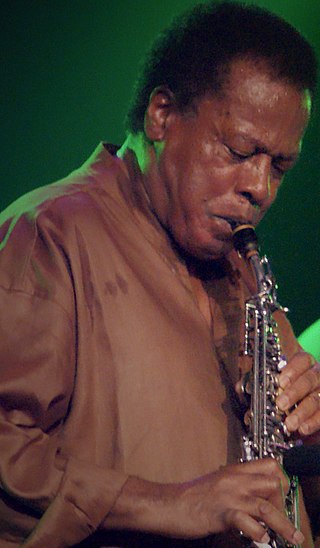
Wayne Shorter was an American jazz saxophonist, composer and bandleader. Shorter came to mainstream prominence in 1959 upon joining Art Blakey's Jazz Messengers, for whom he eventually became the primary composer. In 1964 he joined Miles Davis' Second Great Quintet, and then co-founded the jazz fusion band Weather Report in 1970. He recorded more than 20 albums as a bandleader.

Verve Records is an active American record label owned by Universal Music Group (UMG). Founded in 1956 by Norman Granz, the label is home to the world's largest jazz catalogue, which includes recordings by artists such as Ella Fitzgerald, Cal Tjader, Nina Simone, Stan Getz, Bill Evans, Billie Holiday, Oscar Peterson, Jon Batiste, and Diana Krall among others as well as a diverse mix of other recordings that fall outside of jazz including albums from disparate artists like the Velvet Underground, Kurt Vile, Arooj Aftab, Frank Zappa and the Mothers of Invention and many more. It absorbed the catalogues of Granz's earlier label, Clef Records, founded in 1946; Norgran Records, founded in 1953; and material which was previously licensed to Mercury Records.

Head Hunters is the twelfth studio album by American pianist, keyboardist and composer Herbie Hancock, released October 26, 1973, on Columbia Records. Recording sessions for the album took place in the evening at Wally Heider Studios and Different Fur Trading Co. in San Francisco, California.
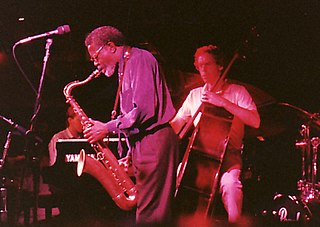
Joe Henderson was an American jazz tenor saxophonist. In a career spanning more than four decades, Henderson played with many of the leading American players of his day and recorded for several prominent labels, including Blue Note, Milestone, and Verve.
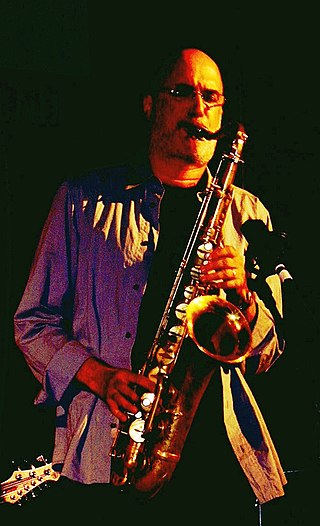
Michael Leonard Brecker was an American jazz saxophonist and composer. He was awarded 15 Grammy Awards as a performer and composer, received an honorary doctorate from Berklee College of Music in 2004, and was inducted into the DownBeat Jazz Hall of Fame in 2007.
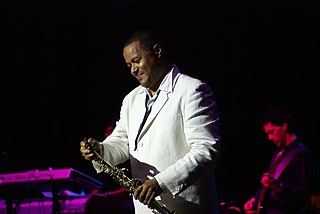
Jerome Najee Rasheed, known professionally as Najee, is an American jazz-smooth jazz saxophonist and flautist.

Dis Is da Drum is Herbie Hancock's thirty-fourth album and his first solo album since leaving Columbia Records. Guests include saxophonist Bennie Maupin, trumpeter Wallace Roney and flautist Hubert Laws.

Future 2 Future is the thirty-eighth album by Herbie Hancock. Hancock reunited with producer Bill Laswell. The two tried to repeat the success of the three previous albums that combine jazz with electronic music.
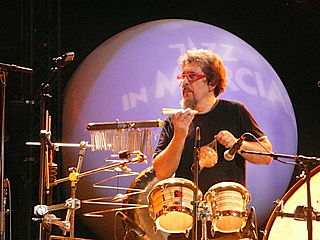
Cyro Baptista is a Brazilian-born percussionist in jazz and world music. He creates many of the percussion instruments he plays.

William Edward Childs is an American composer, jazz pianist, arranger and conductor from Los Angeles, California, United States.

Takin' Off is the debut album by jazz pianist Herbie Hancock released in 1962 by Blue Note Records. The album features veteran tenor saxophonist Dexter Gordon, trumpeter Freddie Hubbard, bassist Butch Warren and drummer Billy Higgins. The album is a creative example of music in the hard bop idiom. The bluesy track "Watermelon Man" made it to the Top 100 of the singles charts, and went on to become a jazz standard. Hancock released a funk arrangement of “Watermelon Man” on his 1973 album Head Hunters. Takin' Off was initially released on CD in 1996 and then again in remastered form in 2007 by Rudy Van Gelder.

Fat Albert Rotunda is the eighth album by jazz keyboardist Herbie Hancock, released in 1969. It was Hancock's first release for Warner Bros. Records after his departure from Blue Note Records. The music was originally done for the TV special Hey, Hey, Hey, It's Fat Albert, which later inspired the Fat Albert and the Cosby Kids TV show.

V.S.O.P. is a 1977 double live album by keyboardist Herbie Hancock, featuring acoustic jazz performances by the V.S.O.P. Quintet, along with jazz fusion/jazz-funk performances by the ‘Mwandishi’ band and The Headhunters.

Billy Eckstine Sings with Benny Carter is a 1986 album by the American singer Billy Eckstine, accompanied by the alto saxophonist Benny Carter. The singer Helen Merrill appears in duet with Eckstine on the first and last songs of the album. This was Eckstine's only LP released on Verve Records, and marked his final album recordings.

West Side Stories is the eleventh studio album by the six-time Grammy Award-nominated, one-time Grammy winning composer, keyboardist and pioneer of the smooth jazz genre, Jeff Lorber, released on Verve Forecast in 1994. After six previous nominations, Lorber won his first Grammy Award on January 28, 2018 for Best Contemporary Instrumental Album for Prototype by his band The Jeff Lorber Fusion.
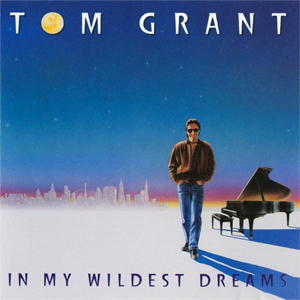
In My Wildest Dreams is a 1992 album by keyboardist Tom Grant featuring David Grant and Wayne Braithwaite.

Worth Waiting For is the tenth studio album by jazz keyboardist Jeff Lorber, released on Verve Forecast in January 1993. The album topped the U.S. Billboard Contemporary Jazz Albums chart at the end of July 1993. Worth Waiting For is the only album by Lorber to hit number 1 on that chart; five others rose to number 2. The album also hit number 33 on Billboard's Jazz chart, and number 71 on the R&B chart.

Straight to the Point is the second album by jazz saxophonist Art Porter Jr., released in June 1993. The album represents a continuation of the smooth jazz and jazz fusion sound that Porter established in 1992 with Pocket City, which he would continue on both of his subsequent albums: Undercover and Lay Your Hands On Me. Zan Stewart reviewed the album for Los Angeles Times, saying it had "solid moments... but just not enough of them."




















